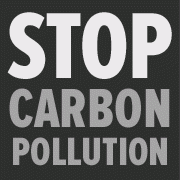 This week, the Environmental Protection Agency held public hearings on its recently proposed rule to limit the carbon pollution freely spewed by power plants that is causing catastrophic climate change.
This week, the Environmental Protection Agency held public hearings on its recently proposed rule to limit the carbon pollution freely spewed by power plants that is causing catastrophic climate change.
Polluters, especially in the coal industry, will made hyperbolic claims that this rule will lead to an economic doomsday scenario. Of course, those are lies to protect their profits and ability to pollute freely.
Meanwhile, many environmental groups lauded the rule as an historic victory that will make significant gains against dangerous pollution. Unfortunately, that’s not the case, either.
The truth is that the Carbon Pollution Standard — while symbolically important because it will regulate carbon pollution for the first time — actually does nothing to reduce current pollution sources.1 Climate change is one of the most urgent problems before us, and the EPA needs to do a lot more. As they taking public input this week, this is an important moment to call for a stronger Carbon Pollution Standard.
The fact is, this rule is weak in a number of important respects. It applies only to unlikely-to-be-built, new coal-fired power plants. It is riddled with loopholes allowing new sources of pollution including some new coal plants.2 It does not reduce carbon pollution from natural gas plants which are also a significant source of carbon pollution. And it does nothing to reduce carbon pollution from much more significant existing sources.3
Because of the rising cost of coal, the low price of natural gas, and the tireless work of activists across the country raising concerns about the health and climate impacts of coal, we’ve already been able to block all new coal power plants. So while this rule does serve as an additional roadblock against building new coal plants if the economics of coal become favorable again, otherwise, it essentially codifies the status quo — making into regulation the facts on the ground already established by the hard work of community and environmental activists.
It’s sad that our political climate has been made so toxic by climate change denying Republicans — who literally voted to deny the science of climate change4 — that the very acknowledgement of the need to regulate carbon pollution by EPA is a victory and a positive step forward.
But in today’s actual climate — where much of our country just experienced record-shattering March heat waves after a disturbing lack of winter — it is not only disappointing but profoundly dangerous that this rule does little if anything to effectively reduce unregulated climate pollution.
Tell the EPA: We need stronger rules to protect us from existing and future sources of carbon pollution.
EPA Administrator Lisa Jackson — who has been one of the few people in the Obama administration willing to fight to address climate change and defend the Clean Air Act — is to be commended for her leadership on this rule, despite a begrudging White House whose hand was forced by a court mandate, and a Tea Party Republican majority in Congress so openly hostile and obstructionist to climate change policies. But it appears even she has her hands tied when it comes to moving forward on the carbon standard.
Having proposed a rule for new power plants, the EPA is now legally required to develop a rule to limit carbon pollution from existing power plants, a much more significant source. But in announcing the new carbon standard, Administrator Jackson literally said in a press conference, “we have no plans to regulate existing sources.”5
If EPA fails to take action on existing power plants, then the measured progress represented by this rule will go down in history as a symbolic though essentially empty gesture.
It’s important to acknowledge progress. And to be upfront about the massive barriers that block even the most modest measures to address climate change. But it’s also essential that we recognize that fighting climate change is one of the most urgent challenges facing us as a nation and a planet. Nothing less than bold action is required, and we must not be satisfied with symbolic but essentially empty gestures no matter how hard won.
1. “Why EPA’s new carbon rules may not have much impact — for now,” Washington Post, March 27, 2012
2. “ New greenhouse gas rules riddled with loopholes,” Greenpeace, March 27, 2012
3. “The top five things you need to know about EPA’s new carbon rule,” Grist, March 27, 2012
4. “GOP-led House rejects science, 240-184,” Climate Progress, April 6, 2011
5. “What’s the deal with EPA carbon rules for existing power plants?” Grist, March 27, 2012

